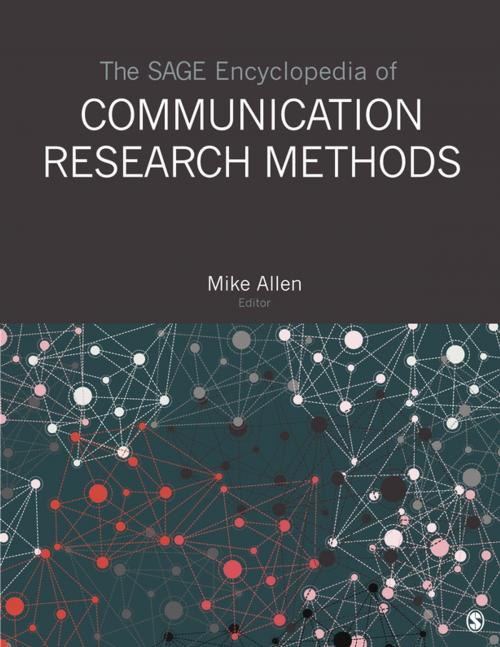The SAGE Encyclopedia of Communication Research Methods
Nonfiction, Social & Cultural Studies, Social Science, Methodology, Reference & Language, Reference, Research| Author: | ISBN: | 9781483381459 | |
| Publisher: | SAGE Publications | Publication: | January 15, 2017 |
| Imprint: | SAGE Publications, Inc | Language: | English |
| Author: | |
| ISBN: | 9781483381459 |
| Publisher: | SAGE Publications |
| Publication: | January 15, 2017 |
| Imprint: | SAGE Publications, Inc |
| Language: | English |
Communication research is evolving and changing in a world of online journals, open-access, and new ways of obtaining data and conducting experiments via the Internet. Although there are generic encyclopedias describing basic social science research methodologies in general, until now there has been no comprehensive A-to-Z reference work exploring methods specific to communication and media studies. Our entries, authored by key figures in the field, focus on special considerations when applied specifically to communication research, accompanied by engaging examples from the literature of communication, journalism, and media studies. Entries cover every step of the research process, from the creative development of research topics and questions to literature reviews, selection of best methods (whether quantitative, qualitative, or mixed) for analyzing research results and publishing research findings, whether in traditional media or via new media outlets. In addition to expected entries covering the basics of theories and methods traditionally used in communication research, other entries discuss important trends influencing the future of that research, including contemporary practical issues students will face in communication professions, the influences of globalization on research, use of new recording technologies in fieldwork, and the challenges and opportunities related to studying online multi-media environments. Email, texting, cellphone video, and blogging are shown not only as topics of research but also as means of collecting and analyzing data. Still other entries delve into considerations of accountability, copyright, confidentiality, data ownership and security, privacy, and other aspects of conducting an ethical research program.
Features:
- 652 signed entries are contained in an authoritative work spanning four volumes available in choice of electronic or print formats.
- Although organized A-to-Z, front matter includes a Reader’s Guide grouping entries thematically to help students interested in a specific aspect of communication research to more easily locate directly related entries.
- Back matter includes a Chronology of the development of the field of communication research; a Resource Guide to classic books, journals, and associations; a Glossary introducing the terminology of the field; and a detailed Index.
- Entries conclude with References/Further Readings and Cross-References to related entries to guide students further in their research journeys.
- The Index, Reader’s Guide themes, and Cross-References combine to provide robust search-and-browse in the e-version.
Communication research is evolving and changing in a world of online journals, open-access, and new ways of obtaining data and conducting experiments via the Internet. Although there are generic encyclopedias describing basic social science research methodologies in general, until now there has been no comprehensive A-to-Z reference work exploring methods specific to communication and media studies. Our entries, authored by key figures in the field, focus on special considerations when applied specifically to communication research, accompanied by engaging examples from the literature of communication, journalism, and media studies. Entries cover every step of the research process, from the creative development of research topics and questions to literature reviews, selection of best methods (whether quantitative, qualitative, or mixed) for analyzing research results and publishing research findings, whether in traditional media or via new media outlets. In addition to expected entries covering the basics of theories and methods traditionally used in communication research, other entries discuss important trends influencing the future of that research, including contemporary practical issues students will face in communication professions, the influences of globalization on research, use of new recording technologies in fieldwork, and the challenges and opportunities related to studying online multi-media environments. Email, texting, cellphone video, and blogging are shown not only as topics of research but also as means of collecting and analyzing data. Still other entries delve into considerations of accountability, copyright, confidentiality, data ownership and security, privacy, and other aspects of conducting an ethical research program.
Features:
- 652 signed entries are contained in an authoritative work spanning four volumes available in choice of electronic or print formats.
- Although organized A-to-Z, front matter includes a Reader’s Guide grouping entries thematically to help students interested in a specific aspect of communication research to more easily locate directly related entries.
- Back matter includes a Chronology of the development of the field of communication research; a Resource Guide to classic books, journals, and associations; a Glossary introducing the terminology of the field; and a detailed Index.
- Entries conclude with References/Further Readings and Cross-References to related entries to guide students further in their research journeys.
- The Index, Reader’s Guide themes, and Cross-References combine to provide robust search-and-browse in the e-version.















